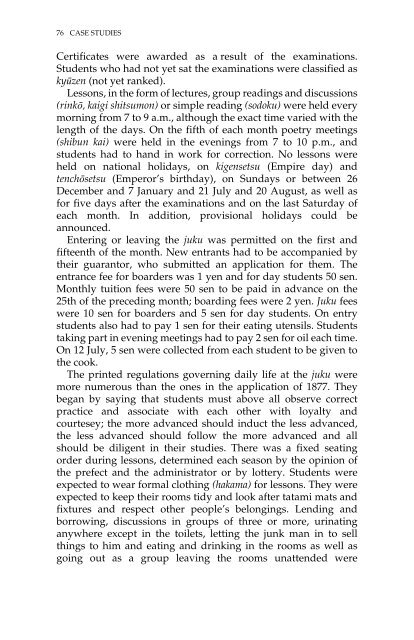Private Academies of Chinese Learning in Meiji Japan: The Decline ...
Private Academies of Chinese Learning in Meiji Japan: The Decline ...
Private Academies of Chinese Learning in Meiji Japan: The Decline ...
Create successful ePaper yourself
Turn your PDF publications into a flip-book with our unique Google optimized e-Paper software.
76 CASE STUDIESCertificates were awarded as a result <strong>of</strong> the exam<strong>in</strong>ations.Students who had not yet sat the exam<strong>in</strong>ations were classified askyūzen (not yet ranked).Lessons, <strong>in</strong> the form <strong>of</strong> lectures, group read<strong>in</strong>gs and discussions(r<strong>in</strong>kō, kaigi shitsumon) or simple read<strong>in</strong>g (sodoku) were held everymorn<strong>in</strong>g from 7 to 9 a.m., although the exact time varied with thelength <strong>of</strong> the days. On the fifth <strong>of</strong> each month poetry meet<strong>in</strong>gs(shibun kai) were held <strong>in</strong> the even<strong>in</strong>gs from 7 to 10 p.m., andstudents had to hand <strong>in</strong> work for correction. No lessons wereheld on national holidays, on kigensetsu (Empire day) andtenchōsetsu (Emperor’s birthday), on Sundays or between 26December and 7 January and 21 July and 20 August, as well asfor five days after the exam<strong>in</strong>ations and on the last Saturday <strong>of</strong>each month. In addition, provisional holidays could beannounced.Enter<strong>in</strong>g or leav<strong>in</strong>g the juku was permitted on the first andfifteenth <strong>of</strong> the month. New entrants had to be accompanied bytheir guarantor, who submitted an application for them. <strong>The</strong>entrance fee for boarders was 1 yen and for day students 50 sen.Monthly tuition fees were 50 sen to be paid <strong>in</strong> advance on the25th <strong>of</strong> the preced<strong>in</strong>g month; board<strong>in</strong>g fees were 2 yen. Juku feeswere 10 sen for boarders and 5 sen for day students. On entrystudents also had to pay 1 sen for their eat<strong>in</strong>g utensils. Studentstak<strong>in</strong>g part <strong>in</strong> even<strong>in</strong>g meet<strong>in</strong>gs had to pay 2 sen for oil each time.On 12 July, 5 sen were collected from each student to be given tothe cook.<strong>The</strong> pr<strong>in</strong>ted regulations govern<strong>in</strong>g daily life at the juku weremore numerous than the ones <strong>in</strong> the application <strong>of</strong> 1877. <strong>The</strong>ybegan by say<strong>in</strong>g that students must above all observe correctpractice and associate with each other with loyalty andcourtesey; the more advanced should <strong>in</strong>duct the less advanced,the less advanced should follow the more advanced and allshould be diligent <strong>in</strong> their studies. <strong>The</strong>re was a fixed seat<strong>in</strong>gorder dur<strong>in</strong>g lessons, determ<strong>in</strong>ed each season by the op<strong>in</strong>ion <strong>of</strong>the prefect and the adm<strong>in</strong>istrator or by lottery. Students wereexpected to wear formal cloth<strong>in</strong>g (hakama) for lessons. <strong>The</strong>y wereexpected to keep their rooms tidy and look after tatami mats andfixtures and respect other people’s belong<strong>in</strong>gs. Lend<strong>in</strong>g andborrow<strong>in</strong>g, discussions <strong>in</strong> groups <strong>of</strong> three or more, ur<strong>in</strong>at<strong>in</strong>ganywhere except <strong>in</strong> the toilets, lett<strong>in</strong>g the junk man <strong>in</strong> to sellth<strong>in</strong>gs to him and eat<strong>in</strong>g and dr<strong>in</strong>k<strong>in</strong>g <strong>in</strong> the rooms as well asgo<strong>in</strong>g out as a group leav<strong>in</strong>g the rooms unattended were













